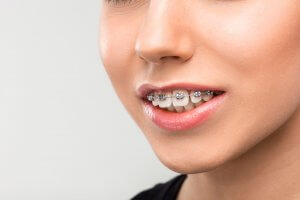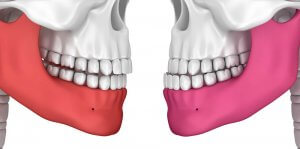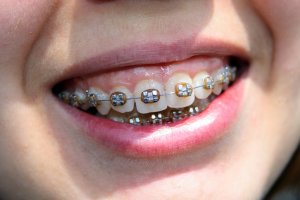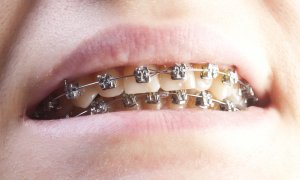An overbite is the overlap or gap between the top and bottom front teeth. It’s fairly common for the upper teeth to sit too far over or in front of the lower teeth, causing overbite teeth problems. Fortunately, dentists have spent generations learning how to fix this, and now overbite correction is the second most common reason people choose to get dental braces.
Here, we’ll answer questions such as:
- What is an overbite?
- What’s the difference between a normal, deep and severe overbite?
- Why should you fix this problem?
- What treatment options are available?
Keep reading to learn more about this common dental malocclusion issue and what to do if you’re worried about it.
What is an overbite?

An overbite is the vertical overlap or horizontal gap between your top and bottom front teeth. A horizontal overbite (an ‘overjet’) causes the upper teeth to protrude at the front of the mouth. When very pronounced, you might hear this called ‘buck teeth’, but we will refrain from using that term here. An overjet may occur along with an open bite, meaning there is a vertical gap between the upper and lower teeth.
When the vertical overlap is 2-4mm, or around 30% of the lower teeth is covered, this is considered normal. A deep overbite, also known as a deep bite, occurs when the teeth overlap by 4-6mm or more. In the case of a very severe overbite, the upper jaw may completely cover the lower teeth and even dig into the lower gum.
An overbite can be both horizontal and vertical, meaning the top teeth protrude at the front and hang too far down over the lower front teeth.
The video below gives a brief visual explanation of these different dental problems:
Causes of an overbite
There are a few different things that might cause this dental problem. Some of the common reasons include:
- Genetics
- A jaw that doesn’t form properly as a foetus
- Thumb sucking as a child
- Overusing a bottle or dummy as a baby
- Tongue thrusting
- Nail biting
- Excessive chewing on things like pencils and pens
Different types of overbite
There are two types of overbite: skeletal and dental. The skeletal kind is caused by irregularities in jawbone development. A dental overbite occurs when there are problems with baby or adult teeth coming through, like overcrowding, or when teeth are put under pressure, for example from thumb sucking.
Overbite vs underbite

An overbite occurs when your upper jaw sits over your lower teeth, whereas an underbite occurs when your lower teeth sit in front of your upper teeth. You can read more about underbite treatment.
Is an overbite bad?
So, do you need treatment for a deep bite or overjet? The British Orthodontic Society has a system for grading orthodontic problems in children called the IOTN. The information in the table below will help you identify whether the condition is severe or normal, and what treatment – if any – might be needed.
Type of overbite | Size | Cause | Requires braces? | Requires surgery? |
Normal | 2-4mm | Usually dental | Unlikely | Highly unlikely |
Deep | 4-8mm | Dental or skeletal | Very likely | Unlikely |
Severe | 9mm or more | Dental or skeletal | Yes | Likely |
There are a range of reasons why it’s a good idea to fix an overbite. Untreated, overbite problems can include:
- Poor dental hygiene
- Teeth wearing down quickly
- Facial pain
- Speech problems
- Poor face structure
- Temporomandibular joint (TMJ) disorders
Perhaps you are considering the treatment options for getting rid of an overbite in your child, and are wondering whether it’s worth putting them through it all. Bear in mind in most cases, the younger the correction takes place, the better. It can be harder to treat an overbite in adults because the jawbone and tooth roots are more firmly developed.
The process of getting braces, surgery, and then long-term retainers for an overbite might be a bit scary but the benefits of fixing misaligned teeth will outweigh the short-term discomfort during treatment.
How to fix an overbite
The first thing to understand is that a normal overbite is around 2-4mm, so you don’t always have to worry about your upper teeth overhanging slightly.
There are different ways your dentist might suggest correcting your bite. Your treatment plan will depend on how severe the problem is, and what has caused it.
Overbite braces

Most overbite correction in the UK is done using braces. Treatment with braces is effective and, when followed up with a retainer, the results should be lifelong. This treatment can take between one and two years; sometimes more.
If getting private orthodontic treatment, you may have the option of clear braces, which are less noticeable than traditional metal ones.
Before getting braces for an overbite, ask your dentist or orthodontist to show you pictures of overbites before and after braces. Knowing what a difference this treatment can make to your smile may help motivate you through the short-term discomfort!
Also ask what preparatory treatments the dentist will need to do. Interproximal reduction (IPR), orthodontic spacers, and extraction are sometimes needed to prepare the teeth for overbite braces.
Invisalign for overbite
Clear aligner braces like the Invisalign system are a really effective form of overjet correction for mild and moderate cases. Although almost invisible, these removable braces apply pressure to move teeth to a much better position, transforming a deep bite to a normal one. Patients usually switch to a new set of aligners every two weeks.

Overbite correction with Invisalign aligners may be quicker than with regular metal braces, but the main advantage of this style is that they are almost unnoticeable.
Although aligner braces are not available on the NHS, many parents are happy to pay the extra for their children to avoid ‘metal mouth’ taunts at school. They are also popular with adults who want to maintain a more professional appearance and have the flexibility to remove their braces.
You can discover more about Invisalign costs in our full guide. Or, find your nearest Invisalign provider and book an appointment online to discuss the treatment plan for you or your child.
At-home aligners to treat overbite
You may be aware of SmileDirectClub and NewSmile, which are alternative aligner brands also available in the UK. The main difference between these and Invisalign is that you don’t have regular dental visits in-person; instead, you check in via an app and your dentist monitors your progress remotely.
The main attraction of these aligners is the cost. Because you’re not spending any time in a dentist’s office, the direct costs are much lower and treatment prices begin from £1,195.
At-home aligners are effective at treating many mild and some moderate orthodontic cases, and this may include some overbites. However, they are generally not suitable for more severe cases.
It’s easy to find out whether you might be a good candidate; just take a two-minute assessment here. Or, browse more details of our recommended brands below.
- Up to 80% cheaper than Invisalign
- Buy now, pay later in interest-free instalments.
- Rated 4.5/5 on Trustpilot
- Starting at just 625 for single-arch treatment!
Caspersmile offers a convenient at-home solution for teeth straightening with their clear aligners. You can achieve a perfect smile in 3-5 months, wearing the aligners for 22 hours a day.
Caspersmile’s treatment is overseen by UK-licensed dentists, ensuring professional guidance throughout the process. The treatment starts with an at-home impression kit or a visit to a scan center, followed by a 3D preview of your future smile.
Every treatment comes with free teeth whitening, so you can brighten your smile while you straighten it!
- Hybrid in-office and remote treatment
- In-person visits with your orthodontist for safe, effective treatment
- Treats even complex cases of misalignment
- Various pricing options
Discover the flexibility and effectiveness of Impress Invisible Braces, the hybrid orthodontic solution that blends in-person care with the convenience of remote appointments. Suitable for both kids and adults, Impress offers a range of treatment options designed to cater to various needs, from mild to severe cases of misalignment. With the initial consultation happening in person, you’re assured of a tailored treatment plan that can address even the most complex orthodontic issues.
Impress Treatment Plans:
- Impress Super Light ($6,999): Perfect for mild cases, this plan promises results in up to 3 months, making it the quickest route to a better smile.
- Impress ($4,599): Designed for moderate cases, this option aims to perfect your smile within 4-10 months.
- Impress Plus ($5,599): Tailored for moderate cases requiring a bit more time, this plan spans 11-14 months.
- Impress Advanced ($6,999): The go-to choice for complex cases, offering comprehensive treatment over 11-24 months.
- Teens ($4,599): Specifically designed for teenagers, this plan addresses mild cases within 4-10 months, ensuring a confident smile during those crucial years.
- Impress Kids ($4,599): Offering orthodontic treatment for children, this plan covers a period between 8-18 months, setting the foundation for a lifetime of healthy smiles.
With flexible payment plans available, starting your journey to a perfect smile has never been easier or more accessible. Whether you’re looking for a quick fix or need extensive treatment, Impress Invisible Braces provide a tailored solution that meets your needs and budget. Click below to get started!
- Free retainers and whitening
- Nighttime aligners available
- 0% interest finance options
£1,395£1,295 or £83.33/month
NewSmile is a Canadian company that brought its clear aligners to the UK market in 2022. NewSmile aligners are made from the clearest material and the company offers excellent service at the best price.
They don’t have any physical locations, so you’ll need to purchase an aligner kit to get started. One of their Impression Specialists will guide you through the process on a video call when you’re ready.
NewSmile aligners are very affordable, costing just £1,395 (currently discounted to £1,295). But even better, this price includes whitening foam to use in your aligners, plus your first set of retainers!
Choose their daytime package for treatment in 4-6 months, or nighttime aligners for a more discreet treatment that takes 8-10 months. Both options come with 0% interest payment plans available.
We always recommend visiting a dentist for a general checkup before starting any at-home treatment. It’s important to deal with any untreated cavities or gum disease before wearing aligners, and you could ask your dentist to assess your overall suitability for the treatment.
Overbite surgery
An overbite jaw caused by skeletal issues usually requires jaw surgery, also called orthognathic surgery. When the lower jaw, or mandible, has not developed properly, surgery can help improve the shape. You can expect your facial appearance to change slightly as a result of the surgery.
In the UK, overbite surgery on the NHS is free of charge for children, where deemed medically necessary. Adults with a severely misaligned bite may be eligible for NHS treatment prices.
Overbite treatment with surgery normally involves one or more of the following:
- Removing of some teeth
- Repositioning the jaw
- Inserting screws
- Adding plates around the jaw
All of the work to fix an overbite in the jaw is done inside the mouth, so it won’t leave any visible scars. Patients will probably have to stay in hospital overnight after overbite surgery, and stay off work or school for 2-4 weeks. Additional orthodontic work usually takes place before and after the surgery to guide the alignment of the teeth.
Summary: Before and after treatment
Before you fix your overbite teeth, you may be very conscious about how you look; especially if you have a deep overbite. You may also experience facial pain, jaw pain and headaches as a result of a deep overbite pushing back your lower jaw and putting pressure on your nerves and blood supply. You might wear your teeth down quicker because there is more strain on them.
Once you have achieved a normal overbite following correction, you might notice a change in your face shape because your lower jaw is further forward. This won’t be extreme; you might need to look at your overbite before and after pictures to see the difference! Any pain you may have felt should hopefully go away after your overbite braces or surgery.
If you have had overbite braces treatment, you will need to wear a retainer afterwards to stop your teeth from moving out of position again.
FAQs
How can you get rid of an overbite?
Correction treatment is generally pretty straightforward. Dentists and orthodontists know how to correct an overbite after years of experience with this treatment in dentistry. You can:
- Get overbite braces
- Have jaw surgery
- Use a retainer
Does Invisalign fix deep bites and overjets?
Yes! Overbite teeth can be fixed with Invisalign removable aligners in most moderate cases. The price for Invisalign overbite correction might be a little higher than metal braces. However, treatment could be quicker and is a lot less obvious to other people.
Can you fix an overbite naturally?

Unfortunately, you cannot fix this problem naturally; you’ll need overbite surgery or braces. If you have a significant overbite and want to know how to fix it, you will need to consult a dentist. It is possible to prevent some cases, such as those caused by thumb sucking, pencil chewing, or overuse of dummies in babies.
Can I get overbite correction in the UK on the NHS?
Children under 18 may be eligible to have overbite teeth fixed on the NHS with braces or surgery. As with any other treatment, approval will depend on the severity of the condition. This will need to be assessed by an NHS dentist.
Adults are only likely to get braces or overbite surgery on the NHS if they have a severe overbite which causes problems with everyday things like eating and speaking. A dentist will need to assess the degree of your overbite jaw before deciding if you’re eligible for NHS treatment rates.
What is a normal overbite?
It’s considered normal when the upper front teeth sit around 2-4mm in front of or overhanging the lower front teeth. Research suggests that the average overbite teeth have is 2.9mm, and around 8% of children have a deep or severe overbite of more than 6mm. In the UK, correction treatment is normally recommended in cases of more than 4mm.
NHS: How much will I pay for NHS dental treatment? Consulted 3rd August 2023.
NCBI: Prevalence and distribution of selected occlusal characteristics in the US population, 1988-1991. Consulted 3rd August 2023.
British Orthodontic Society: Orthodontics & The NHS. Consulted 3rd August 2023.







